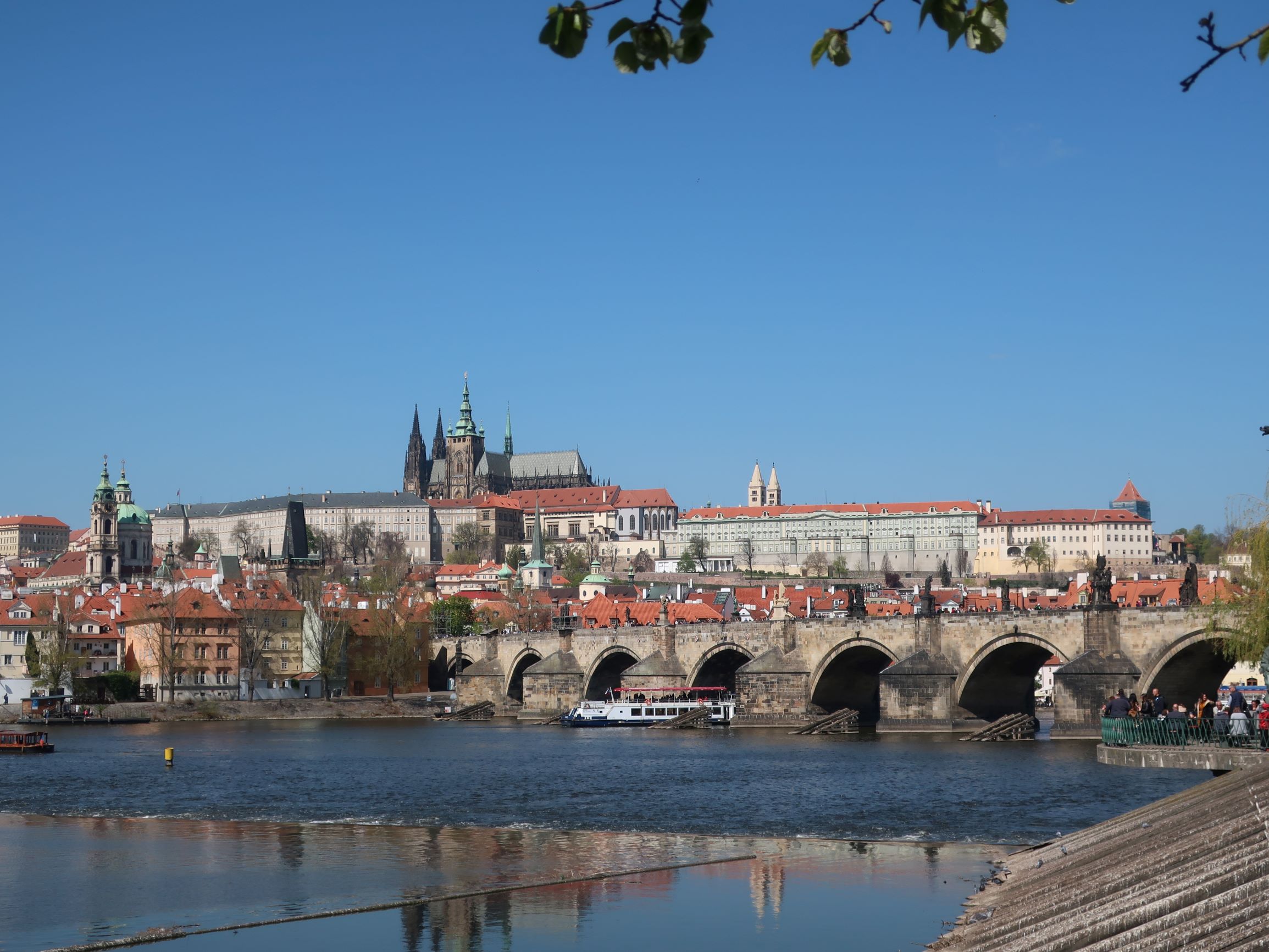Table of Contents
(24) Mr. and Mrs. Dostoevsky wanted to stay in Prague - a near miss with that Smetana! They went to Dresden in tears. Their trip comes to an end.
Mr. and Mrs. Dostoevsky traveled from Florence to Prague for the birth of their daughter.
Previous Article(23) Dostoevsky and his wife's stay in Venice: What did Dostoevsky think of the beautiful water city?In the following section, we introduced Bologna and Venice, where we stopped along the way.
In this article, I would like to talk about that second time in Prague, when the couple and I finally settled down in Dresden.
First of all, let us recapitulate again why the Dostoevskys set out for Prague.
Reasons for going to Prague
During the nine months I spent in Italy, I learned to speak some Italian. I had no trouble talking to maids and doing my business in stores, and I could read and understand most of the newspapers such as Piccola and Secola. My husband, who was busy with his work, of course had no time to learn the language, so I interpreted for him. Now, with joy at hand, we needed to move to a country where my husband could speak French or German with the doctors, maternity nurses, and store clerks without difficulty. We talked for a long time about where we should go and what kind of place would give my husband access to the intellectual community. I suggested that he spend the winter in Prague, near Russia, as he had done in his native land. Here, my husband could make friends with the best political activists, and through them he might be able to join the literary and artistic circles there. My husband, who had repeatedly regretted not being able to attend the Slavic Congress in 1867, immediately agreed. He was sympathetic to the pan-Slavic movement in Russia and wanted to get to know the people there better. Thus, I decided to go to Prague and spend the winter there. My physical condition did not allow me to make the trip, so I decided to take breaks in several cities along the way.
Misuzu Shobo, Anna Dostoevskaya, translated by Hiroshi MatsushitaDostoevsky in Recollection."p204
During their stay in Florence, they found out that Anna was expecting her second child, and they were thinking of moving. Prague was then mentioned as a possible location. As mentioned here, Prague was home to many intellectuals who could also speak with Dostoevsky, who was Russian. And although the Czech Republic was part of the Habsburg Empire at the time, Dostoevsky was also grateful that many Czechs were of Slavic descent. Russians are also Slavic. Dostoevsky's desire to speak with people of the same Slavic descent is understandable.
The boat ride from Venice to Trieste was a rough one. Fyodor Mihailovich was so concerned about me that he would not take a step away from me, but fortunately nothing happened. After two days in Vienna, I finally arrived in Prague ten days later. But what awaited him here was a great disappointment. At that time, the only furnished rooms in Prague were for bachelors, and there were no family rooms, which were quieter and more comfortable. In order to stay in Prague, he had to rent an apartment, pay six months' rent in advance, and furnish all the household goods by himself. This was more than he could afford, so after three days of searching, he had to leave the golden city of Prague, which he had loved for a short time, much to his chagrin. Thus, my husband's dream of having relations with activists in the Slavic world was also dashed. We had no choice but to settle down in Dresden, where we knew the living conditions.
Misuzu Shobo, Anna Dostoevskaya, translated by Hiroshi MatsushitaDostoevsky in Recollection."p205
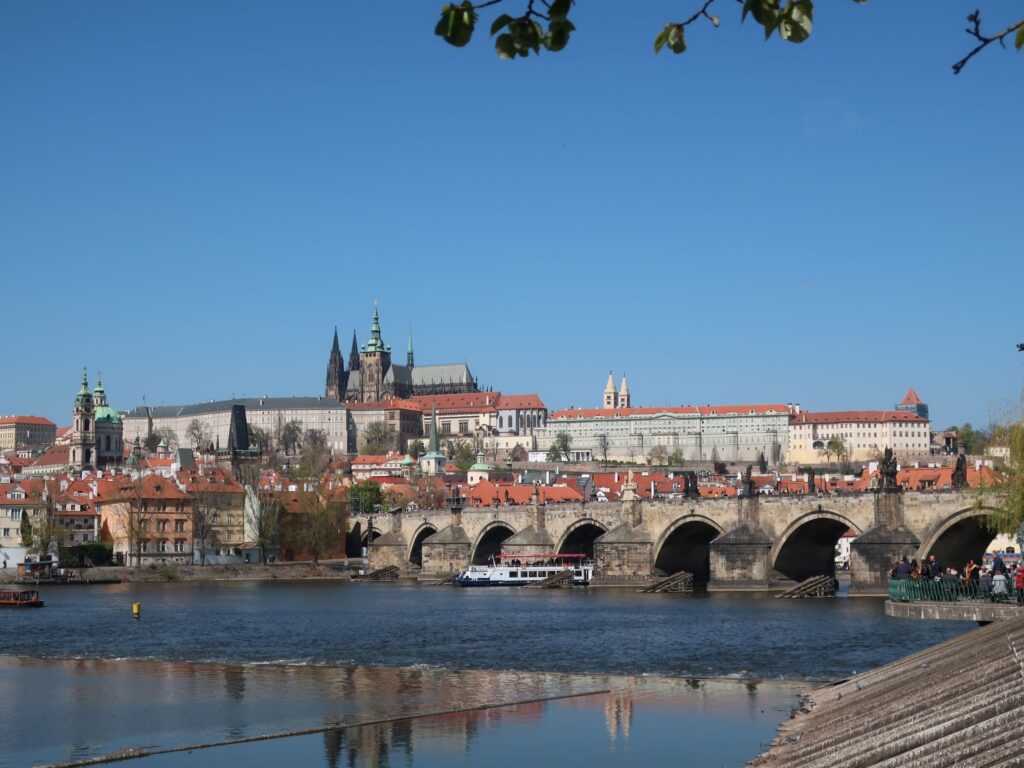
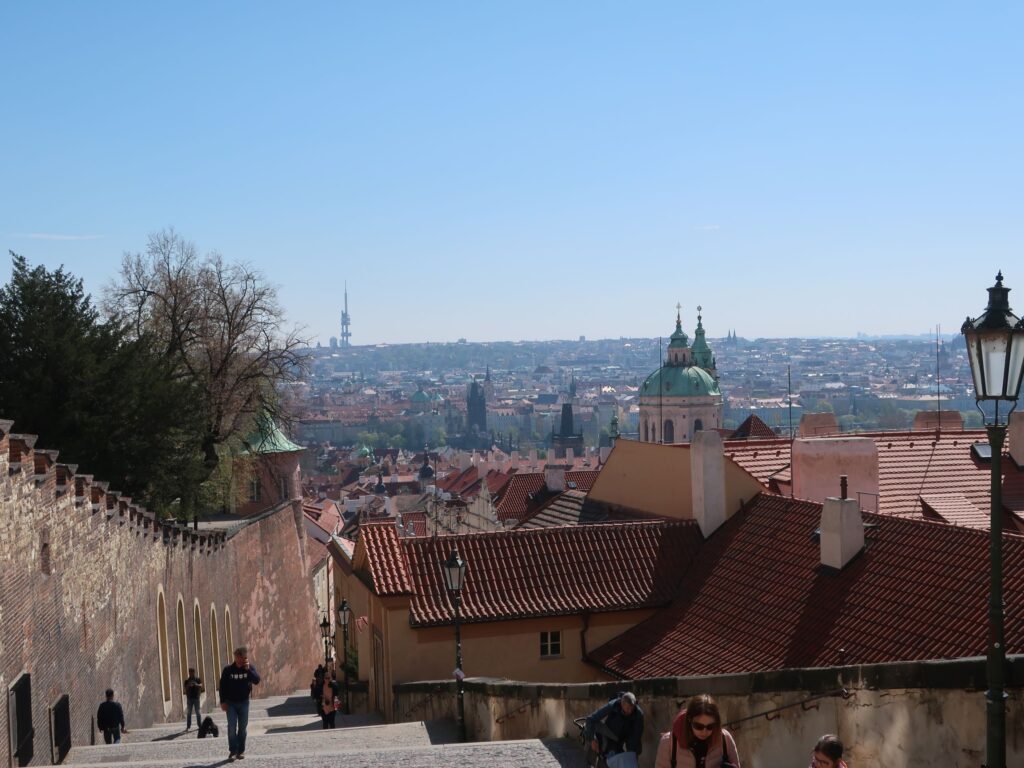
Prague, the city of a hundred towers. One of the most beautiful cities in the world. Medieval cityscape scented with culture and the beautiful Moldau stream. This is also the city I personally love the most.
Everywhere you walk, the scenery is enchanting.
'And yet it is beautiful. Why is Prague so beautiful!"
This is Kazuya Harue'sPrague SpringIt is a line from a novel called "Prague. I wonder if there is any other word that so beautifully describes the charm of Prague.
But that's not all. It wasn't just the visible beauty that captivated me.
Something internal, invisible to the eye. I am sure that it is because I could feel this that I was so attracted to Prague. The history, culture, and spirituality of Prague. I could smell it.
Dostoevsky must surely have felt such a Prague spirituality.
If Dostoevsky could have stayed in this city ..."
In history, "if" is a forbidden but all too alluring "if.
Interestingly, when the Dostoevsky couple arrived in 1869, Smetana, famous for his "Vltava (Moldau)," was active. Dvořák was also a member of his orchestra and was beginning to distinguish himself.
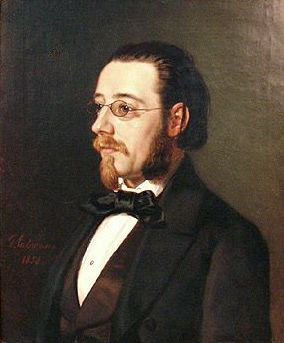
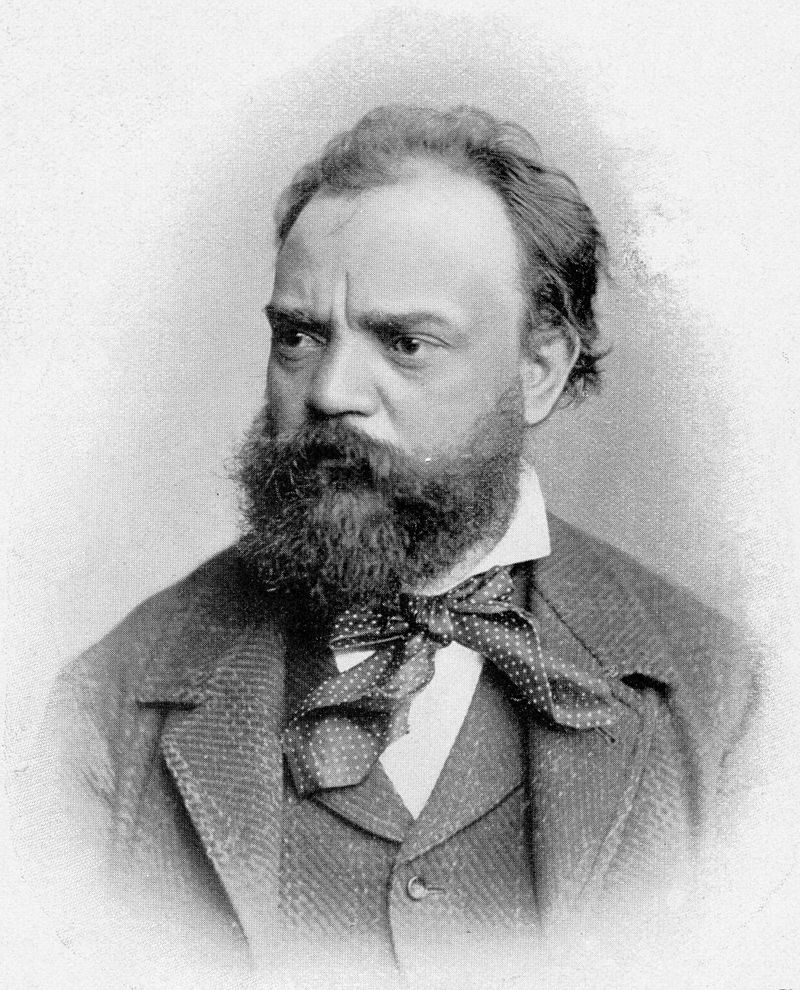
It is possible that Dostoevsky could have had a connection with them. This is of great interest to me because I personally had a strong interest in Smetana.
We have already introduced Prague and Smetana on our blog, so please refer to the following articles. We would be happy if you could learn more about the charms of Prague.
Arrival in Dresden and birth of second child
At the beginning of August, I came back to Dresden and rented a three-room furnished apartment in Victoria Street No. 5 in the English Quarter (my mother came back to help me with the birth). In this house, they were blessed with the birth of their second daughter, Lubowfi, on September 14, 1869. Her husband made this great happiness known to Maiukov, and asked him to become a priest. Three days ago our daughter Lyubovy was born. Everything went well, the baby is big, strong, and well-built" (September 29, 1869, Russian calendar, dated September 17). Of course, from the eyes of the cute and joyful father, the little rose-colored creature must have looked "well-built" to him.
After the birth of the child, the family was happy again. He was so happy that he wrote to Strahov: "Oh, why don't you get married, why don't you have children? He was so happy that he wrote to Strahov: "Ah, why don't you want to get married, why don't you want to have children, my dear Nikolai Nikolaevich? I swear to you that in this there are three-fourths of the joy of life, and everything else is only one-fourth" (March 10, 1870, dated February 26 in the Russian calendar).
Misuzu Shobo, Anna Dostoevskaya, translated by Hiroshi MatsushitaDostoevsky in Recollection."p205-206
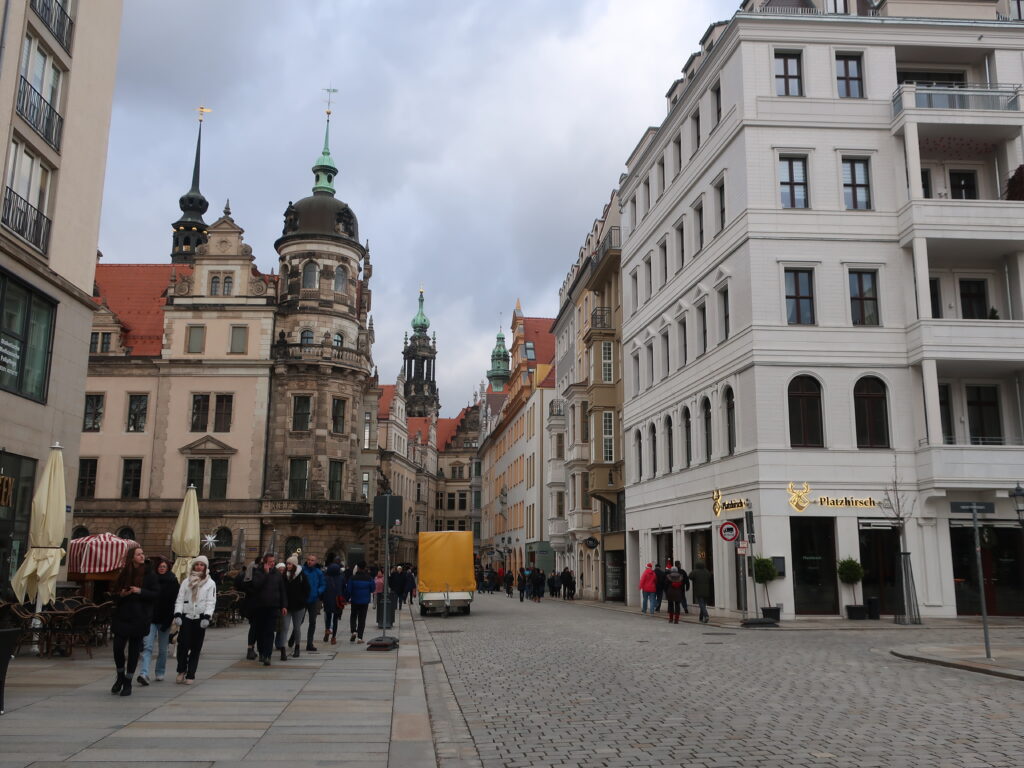
Dostovsky had lost his first child at the age of three months and was in the depths of despair. How much he was comforted by the birth of his second child is probably corroborated by the words of his wife, Anna, above.
Dostoevsky continued to dote on his children long after this. Dostoevsky may have the image of a stern and dark writer, but he also had this side of being a devoted father to his children. His overflowing love for his children also influenced his works. A typical example isThe Brothers Karamazov.It is. There are many children in this work. And their role is extremely important. If you read "Karamazov" keeping in mind that Dostoevsky was fond of children, I am sure you will see "Karamazov" in a different light. We hope you will give it a try.
Writing "The Eternal Husband" and conceiving "The Life of the Great Breaker" - the germ of "Evil Spirits" and "The Brothers Karamazov
In Dresden, we found a nice reading room with Russian and foreign language newspapers. We also made acquaintances among the Russians who had settled in the city, and after the evening service, we would gather at the home of a priest who was very fond of guests. Some of these new acquaintances were thoughtful intellectuals, and my husband enjoyed talking with them. This was a positive aspect of life in Dresden.
Fyodor Mikhailovich is,Husband Forever.After finishing the book, he gave it to the magazine "Reimei" and it was published in the January and February issues of 1870. (Omitted).
During the winter of 1869-70, my husband was busy working on plans for a new novel he intended to call "The Life of a Great Breaker. In my husband's mind, the work would consist of five novels (each on about 15 sheets of printed paper), each of which would be a stand-alone work that could be published in a magazine or published in book form. Each of the five novels would deal with the serious and painful question of whether God exists, a question that had been troubling him all his life. The events of the first novel were to take place in the 1840s, but the material and the various types of the period were familiar to him, and he could continue to write them even if he were abroad. My husband intended to publish this novel in "Dawn. However, he had to return to Russia for the second novel, which took place in a monastery. In this novel, my husband intended to make St. Tikhon Zadonsky the main character, although he had changed his name, of course. He had high hopes for this novel, which he thought would be the culmination of his literary career. This later bore fruit, as many of the protagonists of the long story that was to be written would appear in "The Brothers Karamazov. But the plan did not come to fruition at that time. He wrote to Strahov about this: "I am now writing for 'Russian Report. I have great hopes for the work I am writing now for "The Russia Report," but it is not an artistic work. But not from an artistic point of view, but from a tendential point of view. I want to express some thoughts. Even if I lose my artistry in this, I am still drawn to it by the things in my reason and in my feelings. Even if it ends up in a pamphlet, I intend to express it.
This was the long story "Evil Spirits," published in 1871.
Misuzu Shobo, Anna Dostoevskaya, translated by Hiroshi MatsushitaDostoevsky in Recollection."p206-208
Dostoevsky's late great worksEvil Spirits.", ,Minors.", ,The Brothers Karamazov.Here in Dresden, he was working on "The Life of the Great Breaker," a concept directly related to the
The "Life of the Great Breaker" itself has been transformed into these works, so it no longer remains, but if Dostovsky had lived even five more years, one more of his works might have seen the light of day. But that is an "if. I will refrain from going any further.
Importantly, it was during this trip that the path to his later works was conceived. Dostoevsky gained a great deal from this long trip to Western Europe. I would like to emphasize this fact. (See the following article for more information on St. Chikhon Zadonsky mentioned in the above commentary.)
Mr. and Mrs. Dostoevsky suffer from homesickness
Mr. and Mrs. Dostoevsky left Russia in April 1867. They set out on their journey with the intention of staying only three or four months, but before they knew it, more than three full years had already passed.
During the first three years of my life abroad, although I did have nostalgic memories of Russia, fresh impressions, both good and bad, came one after another, which tended to drown out my nostalgic feelings. However, after entering my fourth year, I could no longer suppress my nostalgia. Although I was surrounded by my husband, children, mother, brother, and other loved ones, I felt that something important was missing. The motherland, Russia, was missing. The nostalgia gradually became morbid and anguished. The future seemed utterly hopeless. I knew I would never go back to Russia, and whenever I tried to return, I always felt that there would be some major obstacle in my way. I didn't have the money, or if I did, I was pregnant or afraid that my child would catch a cold, and I couldn't stand the thought of leaving. A foreign country seemed to me like a prison into which I was thrown and from which I could never escape. No matter how much my relatives tried to persuade me, no matter how much they tried to comfort me, saying that I would be able to return home as soon as things changed, all these words seemed vain to me. I no longer believed these words of comfort, for I had come to firmly believe that I was doomed to be left behind in a foreign land forever. I knew that my longing for my country would cause pain to my beloved husband, who was also far away from his homeland and living in unspeakable pain. Therefore, I tried to be as patient as possible in his presence and to avoid crying or spilling my feelings, but my depressed state often betrayed me. I told myself that I would put up with any misfortune, poverty, or life at the bottom of the heap, as long as I could live in the long-ago homeland that I was unceasingly proud of. When I look back on those days, I realize how bitter and unbearable they were, and how much I did not want even my hated enemies to experience them.
Misuzu Shobo, Anna Dostoevskaya, translated by Hiroshi MatsushitaDostoevsky in Recollection."p212-213
Even after overcoming so many difficulties, Anna had reached her limit. Although Dostoevsky himself has expressed his desire to return home early on in the trip, he knows that if Anna's heart breaks, all is lost. He is completely dependent on Anna. If Anna is not strong, Dostoevsky will fall together.
They were in the fourth year of their wandering journey and were staying in Dresden for the second time. The two had to face a different kind of hardship than the hell of Baden-Baden or the bottom of the heap in Geneva.
In the following article, I will discuss an event that came out of the blue for Mr. and Mrs. Dostoevsky.
What a miracle that Dostoevsky completely recovered from his gambling addiction!
be unbroken
Next Article.
Click here to read the previous article.
Click here for a list of Dostoevsky's recommended books.
List of recommended Dostoevsky biographies."
List of recommended Dostoevsky commentaries.
A list of recommended commentaries on "Dostoevsky and Christianity."
Related Articles











